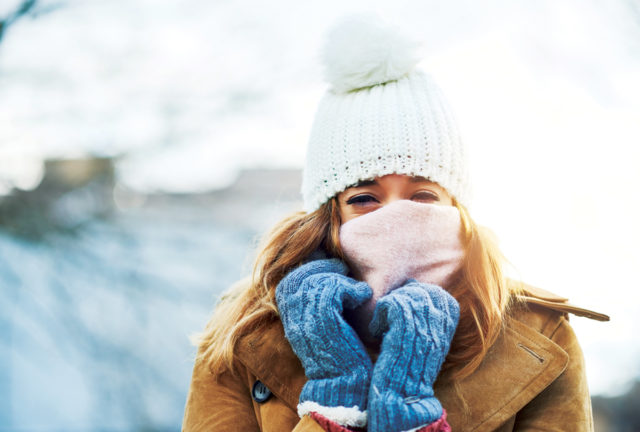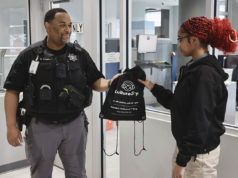7 tips to stay healthy this holiday season
By Christy Rosell
It’s that celebratory time of year again, complete with bright lights, festive events, family gatherings, hot chocolate, stress, and sniffing, sneezing and wheezing. While getting sick isn’t guaranteed, it’s a pretty good bet.
“The average person gets at least one to two viral infections per year,” said Joe Havlik, M.D., West Georgia Infectious Diseases at WellStar Cobb Hospital.
And, the most wonderful time of the year also is known for being the most contagious.
Seasonal viruses
“Infection prevention is important around the holidays because we tend to be indoors, and in close proximity to others, due to holiday activities and colder weather,” Dr. Havlik said. “Both of which put us at a higher risk of spreading bacterial and viral pathogens.”
Other factors put additional strain on our immune systems. “Around the holidays, people are tired,” said Brian Nadolne, M.D., who cares for children and adults at East Cobb Family Medicine, a Northside Hospital physician practice. “They work really hard to get ready for time off. And they might be slightly compromised because they’re not getting enough sleep.”
And, certain viruses are seasonal. The flu, RSV (Respiratory Syncytial Virus) and strep throat are prevalent this time of year. Jaime Rodriguez, M.D., a pediatric urgent care physician at Children’s at Town Center Urgent Care Center, was already seeing a lot of children with strep throat in the fall, when she was interviewed for this article.
“We’ve been telling parents to make sure children stay home until they’ve been on antibiotics for 24 hours, and to make sure they’re washing their hands and not around other children or other people,” she said.
Seniors fighting seasonal viruses
Dr. Havlik noted that it’s highly important for older patients to protect themselves against germs. “Our older patients tend to have weaker immune systems based on their age, and as a result of some of the medical issues they may have,” he said. “This can put them at higher risk of succumbing to bacterial and viral pathogens, if they are exposed.”
This can be even more important if a person lives in an assisted living community. “Pathogens are not necessarily in higher concentrations in assisted living facilities, rather it’s likely the close proximity to other residents that can cause bacterial and viral pathogens to spread more quickly,” he said. “Once someone in the facility is exposed to the flu or other respiratory pathogens, they spread more easily due to their close contact with others.”
2019 outbreaks of measles & meningococcal meningitis
This year, there have been alarming outbreaks of preventable diseases. According to the Centers for Disease Control & Prevention (CDC), there have been more than 1,200 cases of measles in 2019, the highest number the United States has seen in the last 25 years. And Georgia is among the 31 states affected at the time this article went to print.
There also have been recent outbreaks of meningococcal meningitis on U.S. college campuses this year. The potentially deadly disease is spread through respiratory and throat secretions among people who live in close quarters.
With these looming threats, we all want to make sure we’re doing our best to protect ourselves. So we can live life to the fullest, and be healthy enough to make new memories with families and friends this time of year, Drs. Nadolne, Rodriguez, and Havlik offer some advice:
1. Give the gift that keeps on giving: Vaccination!
Dr. Havlik: Get the flu vaccine yearly. We actually encourage people over 65 to get the flu vaccine with the higher dose.
Dr. Rodriguez: They also need primary vaccinations recommended by the American Academy of Pediatrics and the CDC. Now that people aren’t getting vaccinated, we see a lot more children with pertussis, also known as whooping cough.
Dr. Nadolne: Measles can spread like wildfire. If you’ve ever seen measles, these kids are typically very sick. It is highly contagious. The vaccine is incredibly effective. The more people vaccinated, the more protection you have against it spreading.
2. Dig into that fruitcake after you wash your hands
Dr. Nadolne: People forget the simple stuff like wash your hands and wash your face if you’re in contact with a lot of people. For instance, wash your hands with a lather for 30 seconds, dry your hands with a paper towel and shut the water off with the paper towel.
Dr. Rodriguez: I do not get viruses often. I wash my hands all the time. I use hand sanitizer before I eat. I wear a mask in the wintertime when there’s a child who has a cough.
3. Get on Santa’s “Nice” list by getting those Z’s.
Dr. Rodriguez: Good sleep is important. It should be around nine hours of sleep per night for school-aged kids.
Dr. Nadolne: Make sure you get plenty of sleep. Sleep is restorative. People stay up late; they don’t realize adults should get seven to eight hours per night. The trick is to ask yourself if you are you well rested when you wake up? Routine is important. Do your children get up in the morning right away?
4. Did Santa just say “Hy-hy-hydrate”?
Dr. Nadolne: Drink plenty of fluid. The importance of water cannot be understated. Your urine should look clear.
5. Eat veggies before the gingerbread men.
Dr. Rodriguez: Eat a healthy diet!
Dr. Nadolne: I’m a big believer in vitamin C and eating fruits and veggies. Some of the over-the-counter Airborne and Emergen-C supplements are really high-quality vitamin C. They help to prevent you from being more susceptible. It’s good if you feel something coming on, but not if you’ve got a full-blown cold.
6. Share love, not germs.
Dr. Nadolne: Let’s hug, but let’s not share forks and drinks. If you cough, cough into your sleeve, not in your hand.
Dr. Havlik: If you are ill, avoid gatherings where you could potentially spread the pathogens.
Dr. Rodriguez: If it’s possible, separate your children. Try not to eat and drink after each other.
7. Echinacea makes a great stocking stuffer.
Dr. Nadolne: Herbal medicine such as Echinacea is shown to be very helpful. If you’ve got a cold, take Echinacea three times a day and it will help the white blood cells work harder for you and will help stave off illness. But it’s not going to work on the flu.
Thanks to these Cobb physicians for helpful tips to stay healthy this season. For more information about getting vaccinated or for urgent care locations:
- Children’s Healthcare of Atlanta Urgent Care Center at Town Center — choa.org
- Northside Family Medicine and Urgent Care at East Cobb — northsideurgentcare.com
- WellStar — wellstar.org




